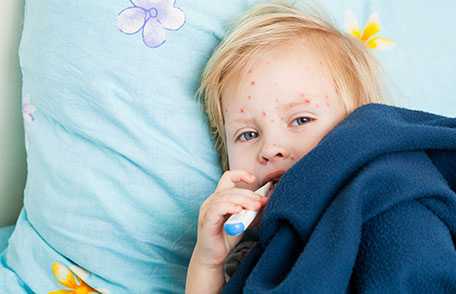Chickenpox Can Be Serious

Most children who get chickenpox recover completely. But it can be serious, even deadly, especially for babies, pregnant women, adolescents, adults, and people with weakened immune systems. Make sure everyone in your family is up to date on their chickenpox vaccine.
Chickenpox vaccine is the best way to protect your family from chickenpox.
CDC recommends:
- Children get the first dose of chickenpox vaccine at 12 through 15 months old and the second dose at age 4 through 6 years.
- People 13 years of age and older who never had chickenpox or been vaccinated should get two doses of chickenpox vaccine at least 28 days apart.
If you or your child only got one dose in the past, check with your doctor about getting a second dose.
First the Rash, Then the Blisters
Classic chickenpox symptoms are—
- Red, itchy rash that usually starts on the face, chest, and back then spreads to the rest of the body
- Fluid-filled blisters, resulting from the rash, that crust over usually in one week
Chickenpox Can Be Serious
Chickenpox can be severe especially for babies, pregnant women, adolescents, adults, and people with weakened immune systems. It can cause—
- dehydration
- pneumonia
- bleeding problems
- brain infection or inflammation
- bacterial infections of the skin and soft tissues in children including Group A streptococcal infections
- blood stream infections (sepsis)
- toxic shock syndrome
- bone infections
- joint infections
- death
Chickenpox Vaccine is Safer Than Getting Chickenpox
Two doses of chickenpox vaccine are very effective at preventing disease, including severe disease, complications, and death. Although rare, you can get chickenpox if you have been vaccinated. However, the symptoms are usually very mild, meaning fewer blisters, little or no fever, and quicker recovery.
Also, when you get vaccinated, you protect others in your community. This is especially important for people who cannot get vaccinated. People who cannot get the chickenpox vaccine include pregnant women and those with weakened immune systems. Learn more about who should not get chickenpox vaccine.
Paying for Chickenpox Vaccine
Most health insurance plans cover the cost of vaccines. However, you may want to check with your insurance provider before going to the doctor. Learn more about the VFC Program or ask your child’s doctor. If you don’t have health insurance or if your insurance does not cover vaccines for your child, the Vaccines for Children (VFC) Program may be able to help. This program helps families of eligible children who might not otherwise have access to vaccines. To learn more, visit the VFC website or ask your child’s doctor. You can also contact your state VFC coordinator.
If you have any questions about chickenpox or the vaccine, talk with your doctor.
Take the Quiz
Take the chickenpox quiz to test your knowledge.
More Information
To learn more about chickenpox and vaccination, visit
- CDC Chickenpox Website
- Chickenpox Fact Sheet for Parents
- Chickenpox Vaccination
- Chickenpox Vaccine Information Sheet (VIS)
- Two Options for Protecting Your Child Against Measles, Mumps, Rubella, and Varicella
- CDC Podcast: Chickenpox – What You Need to Know [Podcast – 4:06]
- Chickenpox-related Information for Travelers
- Page last reviewed: September 11, 2017
- Page last updated: September 11, 2017
- Content source:
- National Center for Immunizations and Respiratory Diseases, Division of Viral Diseases
- Page maintained by: Office of the Associate Director for Communication, Digital Media Branch, Division of Public Affairs




 ShareCompartir
ShareCompartir